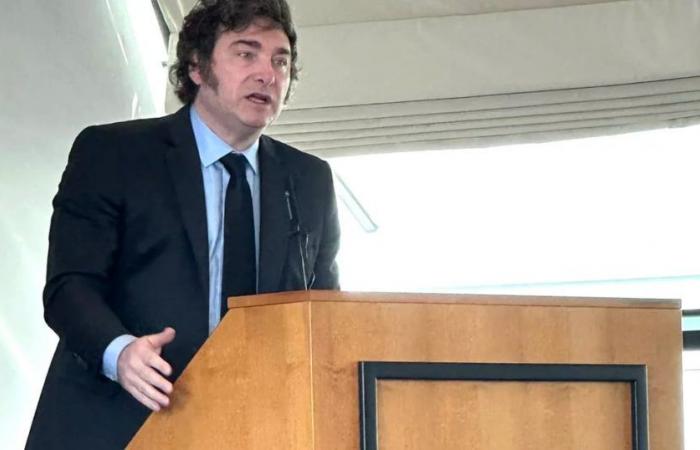
President Javier Milei He spoke again about his idea of coin competition in one of his two speeches in Europe within the framework of awards for libertarian economic study centers and insisted that the monetary policy scheme he envisions includes the closure of the Central Bank. It is a position that is not shared by the IMF, which a few days ago indicated that the regulatory entity should retain central roles for the financial system.
The head of state spoke at the Real Casino in Madrid on Friday in a ceremony in which he was awarded by the Juan de Mariana Institute, a think tank liberal who years before had already given that award to Argentine economists Alberto Benegas Lynch, Alejandro Chafuen and Carlos Rodríguez Braun. In a one-hour message, Milei reiterated what the economic inheritance she received was, what the first measures were and what the next steps of economic management would be, which she interspersed with considerations of economic theory.
Milei anticipated that he will first seek to reform the financial system so that it is “anti-runs” with a rescue scheme do not depend at any time on the Central Bank
In a passage in which he spoke about the upcoming monetary plan, the president once again referred to the “endogenous” dollarization, which would imply a kind of currency competition in which the dollar has the upper hand at the expense of the peso. In that sense, Milei placed the beginning of the next monetary scheme at the moment in which the lifting of exchange controls takes place.
On this level, the president anticipated that he will first seek a reform of the financial system to be “anti-runs” with a rescue scheme do not depend at any time on the Central Bank. “Closing the fiscal tap, closing the financial tap, closing the external tap, because the exchange rate is going to be free, we are going to go not only to a system of free competition of currencies, but we are going to declare the monetary issue a crime against humanity,” he said.
Regarding endogenous dollarization, he stated: “As the amount of pesos is fixed, and to the extent that individuals need to monetize, they will bring their own currencies and make transactions in the currencies they want. And if you notice, that is going to make every time weight has much less role or importance within the number of transactions that are made, and there will come a time when It will be so small that we are going to close the Central Bank”, he anticipated.
While key fundamentals are being developed, eventual ‘currency competition’ within the regime could leave it resembling the system of managed float that prevails today in Peru and Uruguay (IMF Staff Report)
The President’s postulates are far from the opinions expressed by the Fund’s technical team in its last report, in which it outlined the contours of a currency competition as the next step – already discussed, but with issues to be defined in the future – of monetary policy. . The IMF’s vision becomes important when considering that the Government seeks additional financial support from the organization as a step to eliminate the exchange rate trap.
The IMF’s idea of currency competition is less disruptive than what Milei lets us know. “While key fundamentals are being developed, eventual ‘currency competition’ within the regime could leave it resembling the managed float system that prevails today in Peru and Uruguay,” the technicians mentioned. These two countries had, in recent decades, systems of bimonetary economy which allowed them to lower inflation consistently. Neither nation completely dollarized its economy, but it did allow the use of the North American currency for savings and exchange.
“To the extent that individuals need to monetize, they will bring their own currencies, that will make the peso have a much less role and there will come a time when it will be so small that we will close the Bank.” Central” (Milei)
“Price stability will continue to be a primary objective of the Central Bank, in a context in which individuals are free to save and transact in the currencies of your choice”, anticipated the IMF. Regarding the limitations that the BCRA would have in the face of a scheme of this type, the technicians listed: “To the Central Bank would be prohibited from providing funding to the government and would continue to refrain from transferring benefits to the Treasury.”
It would also “maintain its functions as lender of last resort for eligible (solvent) financial institutions, it would continue sterilizing currency purchases and would manage liquidity over time through open market operations with government securities. In addition, accounting practices would continue to be perfected so that the BCRA balance sheet reflects the fair value,” the Fund stated.
“He staff supports an eventual transition to a new regime with a firm nominal anchor where prices and financial stability remain the main objectives of the central bank and where individuals are free to save and transact in the currencies of their choice. However, work must continue to better define the central bank’s role in liquidity management and safeguard the stability of the financial sectorwhile more coherent communication about the new monetary and exchange regime will be essential,” the technicians warned.
“Commitments not to maintain any net monetary financing or transfer profits from the central bank to the Treasury are laudable, and consideration should be given to enshrine these commitments in law, even to strengthen the independence of the central bank,” they considered. The closure of the entity does not appear as a possibility for Washington, at least in this instance of conversations.
“The 80/20 is maintained and the Fund has NO problem with this,” emphasized Caputo.
This Friday, for now, the Minister of Economy Luis Caputo He made reference to the open negotiations with the Monetary Fund although he did not mention the issue of currency competition. “There is no devaluation planned,” the head of the Treasury Palace said on holiday Friday in his account. x.
Caputo reaffirmed that the 80/20 exchange rate schemealso know as “exporter dollar” either “dollar blend” which allows companies to sell 20% of their income in dollars in the financial market and settle the remaining 80% at the official exchange rate, will remain in force. “The 80/20 is maintained and the Fund has NO problem with this (it is in the statement because it comes from before when we estimated that the law could pass in March),” he explained.
Another point highlighted by the minister was the continuity of the gradual adjustment of the exchange rate. “He crawl 2% is also maintained”, he indicated, referring to the exchange rate adjustment mechanism at a monthly rate of 2%, designed to avoid abrupt fluctuations and as a nominal anchor that plays a key role in the attempt to reduce inflation. “We have not yet started negotiations on the next agreement with the Fund, with which we maintain a very good relationship,” he stressed.





